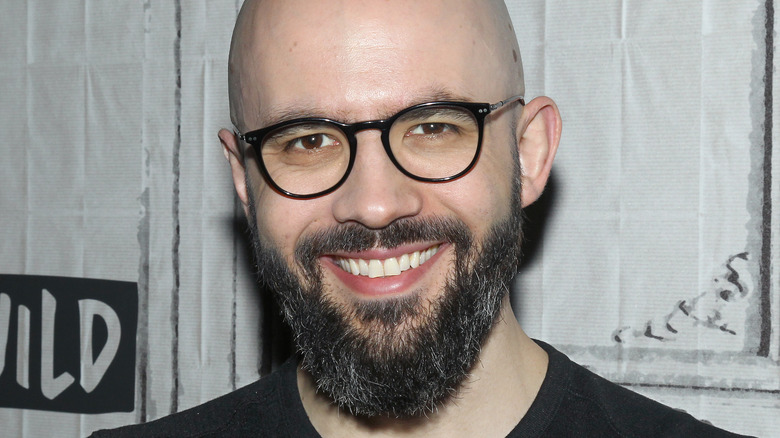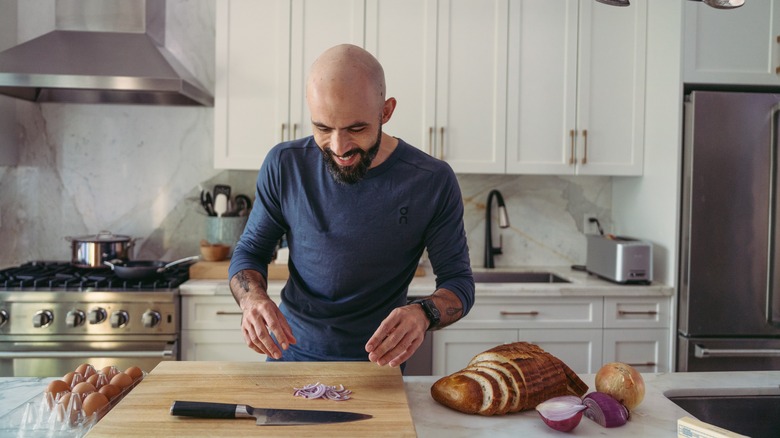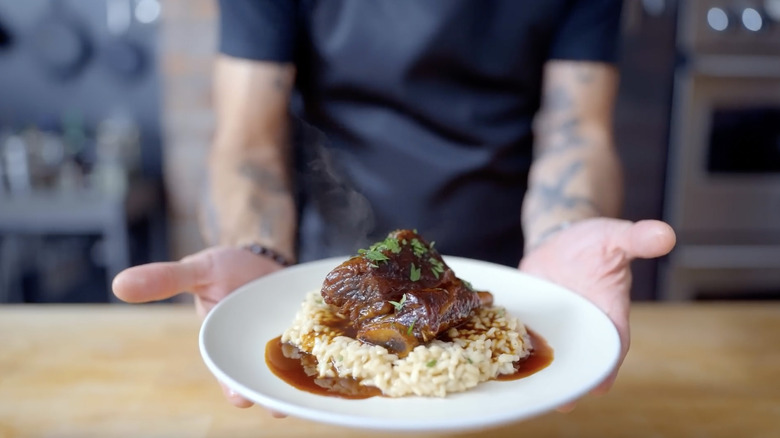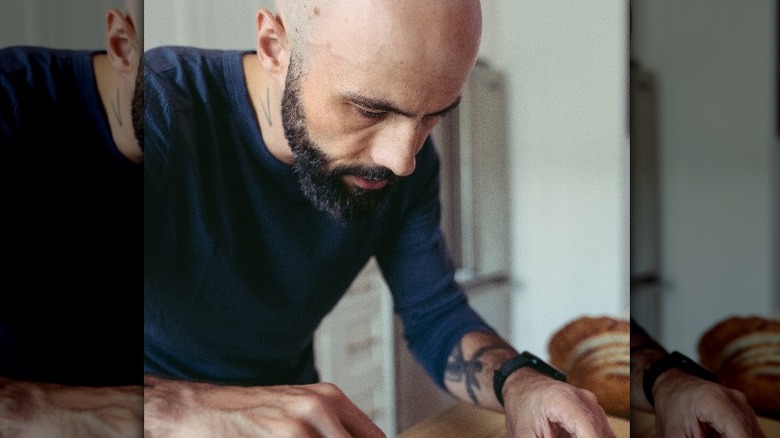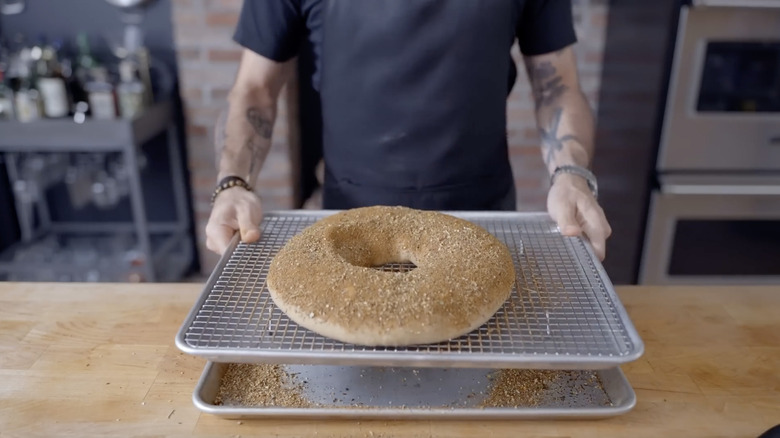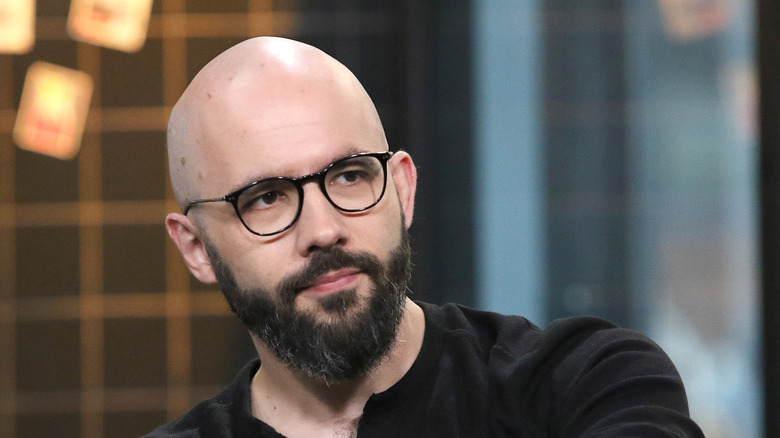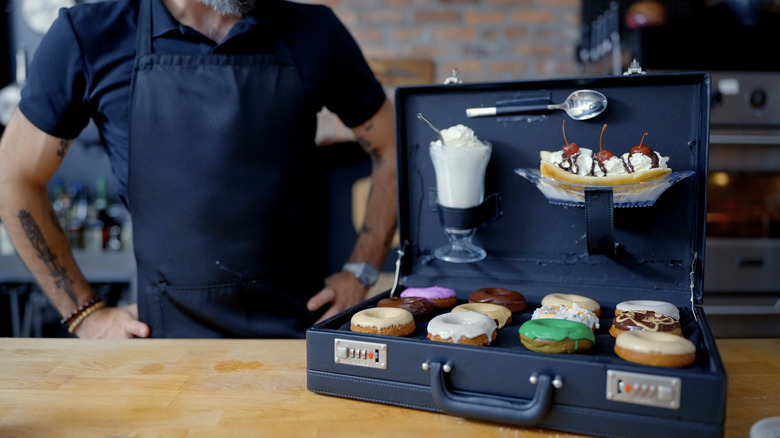How Binging With Babish's Andrew Rea Leveled Up His Cooking - Exclusive Interview
If you constantly find yourself scrolling YouTube, TikTok, and Instagram for the latest food and cooking content, then you've likely come across Binging with Babish. The mammoth cooking channel has nearly 10 million subscribers on YouTube and specializes in creating culinary works of art from favorite movies and television shows. Andrew Rea is at the helm, and since first launching Binging with Babish, he has also grown the brand to include other content, a cookbook, merchandise, and more.
One of Rea's most recent projects was a collaboration with On, a Swiss performance running shoes and apparel brand. In collaboration with the Flow Research Collective, On had invited a group of creatives to run as part of a 30-day challenge, to see how the running — and achieving a flow state while running — impacted the creatives' work. (For those who aren't familiar, achieving a flow state is very similar to being "in the zone"; it's when you're highly concentrated on just one thing, so you can get more done at a higher level.)
We caught up with Rea to see what he had to say about the challenge, how running leveled up his cooking, and how he's planning for the future of Binging with Babish.
Getting into the flow state
Tell us a little bit about what inspired you to partner with On and Flow Research. Why was that something you wanted to do?
I wanted to partner with On well before they approached me. I didn't approach them. I was a fan of their products. I owned a few pairs of Ons myself — I used them for running. They came to us. It was almost manifested.
As soon as they came through, I was excited to work with them as a brand. The messaging with the flow states campaign that they're doing here is such a net positive for people who try it that I can't recommend it enough. Not only do I fully endorse the product, I endorse what they're doing with it. It's really exciting.
What has the 30-day challenge included? Are there any requirements for you to run every single day, or that you have to run a certain amount of time or distance?
You have to run pretty much every day. You get a couple of breaks in there, but the idea was to gradually increase the time — not the distance necessarily, but the time. You start with 20-minute runs and move up to 30-minute runs. At first, you're allowed to have your headphones. You're allowed to do your normal routine, because running, especially for the uninitiated, is pretty uncomfortable. I hate to say that, but it's the truth, and it's not something that, before this integration, I ever would've sought out myself. I'm not terribly good at it.
The program was designed to improve your running and increase the amount, the distance, and the duration that you can run. Moreover, as the weeks went on, you couldn't use music and eventually had to try to focus on these flow states and trying to enter them while doing a very physically strenuous activity, which sounds counter-intuitive at first, but it actually works very well.
Did you find that getting into this habit was challenging, or were you already a pretty active person in other ways? How big of a transition was this for you?
I'm very lucky that I was already in the middle of a month-long fitness journey, so this was a very welcome addition to my routine, and I committed to doing it in addition to my routine, not in place of it. It basically helped me burn a hell of a lot more calories every week, so I got to eat more of what I wanted. It certainly made me a better runner, and since then, I've gone out running without On even paying me to do it. That's a huge improvement.
An important coping mechanism
At what point did you start to see the benefits of being in the flow state? What was that experience like in terms of increasing focus?
I'm no stranger to flow states. Happily, I first read about them in high school in a book called "Flow." It is a very scientific approach to, in some cases, a spiritual state. I am a frequent constant meditator. It is one of my most important coping mechanisms, and that in and of itself is sort of a flow state. As an editor, as a filmmaker, there are a lot of opportunities to enter flow states there, so I was not unfamiliar with the concept before starting this campaign.
Applying it to running was certainly a challenge because when you're running, almost all your attention is consumed by it, so the idea of taking on this challenge at first is daunting, and then you realize that the challenge is not to take on a challenge. It is to focus entirely on what you're doing to the point that nothing else exists. You think that it's going to be this added challenge, when in fact, it's asking you to tune in to what you're doing and be as present as possible. Those are the hot words in 2022: self-care, presence, mindfulness.
Then, you realize that running not only is a good opportunity to try to explore these states, [but also] that it can, in fact, induce these states where you can't think about what you are going to have for dinner tonight, or how behind you are on work, or how you haven't paid your parking tickets yet.
You have to think about where your foot is going in the next stride, or you're going to fall, or you're going to twist your ankle, you're going to run out of breath, or you're going to get a cramp. Focusing in on that sensation, that action, helps you forget about everything else for a minute. As human beings, we neglect how valuable of an experience that is to have on a daily basis.
Finding more joy
How did you see that practice and the benefits of that impact other areas of your life or other areas of your career?
During the 30-day run challenge, I had a lot more joy for my work. I've recently gone through some pretty horrible things this past year that I won't get into, but ... since doing the 30-day challenge, and while I was doing the 30-day challenge, I went on to make my most labor-intensive creative episode of my show ever, the one that I may be the most proud of.
That could be a coincidence that I made that during this period, that I did have more creative energy and output and bandwidth. That could be a coincidence, but I doubt it. Where there's smoke, there's fire, and this was a tremendous part of my daily routine. It would make sense that it would affect other parts of my daily routine. Thankfully, it's only positive.
Which of your episodes is the one that was the most labor-intensive?
Recently, I did the everything bagel from "Everything Everywhere All at Once," and that movie's about universe popping and multiverse stuff, so I wanted to do some multiverse things. I did some visual effects. I did some camera trickery, and I had a blast. I pulled the first all-nighter that I've pulled in my 30s or since 35. I was obsessed with what I was doing because I was so excited about it ...
It could be an accident that I made that during this 30-day challenge, but I truly believe that it energized other aspects of my life. [There was] that 30 minutes that I spent running that I might have otherwise spent answering emails, or trying as hard as I possibly could not to think about work, or desperately trying to relax, or any other of the known repetitive, familiar tasks that I'm faced with every day. Instead, I was forced to be present. I was forced into an unfamiliar and challenging environment, and as such, forced into presence.
Having 30 minutes a day where your brain's off or you're just where you are at — that has a ripple effect throughout your day, throughout your week, throughout your life. Again, we could say that it's a coincidence or it's an accident that I made that episode during the 30-day run challenge, but I tend not to think so.
Do you think that the 30-day process, the running, the flow state, has made you a better chef and a better content creator?
It's absolutely made me a better chef and a better content creator because it quieted the voice in my head for 30 minutes, which anybody on planet Earth would benefit wildly from. I definitely did.
Top tips for getting started
You have continued running even though your 30 days are technically up — do you intend to do that indefinitely?
I like a good mix of exercise. I'm definitely not going to be doing the challenge for the rest of my life. Two [or] three times a week as my cardio routine, I'm working a run in there instead of hopping on the bike. I've made it part of my gym and self-care routine, and it is amongst the most challenging exercises that I do on a day-to-day basis.
Again, I was never a runner. I was on a track team because I had to be on a school sports team of some kind in middle school. I lost every event, and I was a benchwarmer on track, which is hard to do. Running has never ever been something I'm good at or something that's even in the forefront of my mind or something that I want to do. But now it's something that without even thinking about it, I enjoy doing, because it's got this whole new facet to it that other exercise doesn't have.
If someone's reading this and they're thinking, "That sounds so great; I'd love to do this. I'd love to start running," what are some of the top tips or advice that you would give them?
Start slow. The challenge starts pretty easy, but start with exactly where you feel your limit is, because if you push too hard on the first day, you're going to be real sore on the third day, and you're not going to want to do it anymore. It's the going-back-to-the-gym curse where you're like, "I'm so strong. I can do this," and two days later you want to die. Go easy.
Remember that it gets easier after about 10 minutes. When you're starting out running, your whole body for the first 10 minutes is screaming at you, "Stop. I hate this. You can't do this. You're no good at this. You're tired already. You haven't even gone half a mile. Go home. It's warmer there. It's nice. You have all your things there. You don't have to be out here."
Your whole body is screaming that at you, but after 10 minutes it realizes, "Oh, I can do this." It's very difficult upfront. Power through; keep going.
I sometimes was running with my eyes closed — which is super inadvisable — to try and concentrate and get in one of these flow states. Keep your eyes open, and in terms of getting into the flow states, try to focus on everything that your body's telling you. It might be good things; it might be bad things; it might be "This part hurts, this part is feeling good and limber, this part's getting hot" ...
Listen to what your body's telling you. Tune in and care about what your body's telling you. Before you know it, you're going to be focusing on the present moment because that's where the present moment lies. Try to remain as present as you can by paying attention to what's happening right now, not thinking about what's about to happen, not thinking about what just happened, but what's happening right now.
Next goals
You hit 10 million subscribers on YouTube this year, is that right?
We're right on the cusp. We're at 9.9 [million], or 9.89 as of this morning. We're probably about two months away.
What does that mean for you? How does that feel, knowing that you have grown and cultivated such an invested and large audience?
10 million subscribers has been such an impossible goalpost over the past six years. One million subscribers was an impossible goalpost before that. Even though it might be two months away, it's surreal. As we're closing in on it, it feels completely surreal. I am as shocked as I am honored that people are still sticking with me, still subscribing, still watching, and we're very excited as a company. We keep growing. I used to talk about the channel in terms of me and I, and now there are six of us.
We have plans and the intention to expand what we do as a company rapidly and wildly in the next year, from a production standpoint, from a licensing standpoint, from a merchandising standpoint, and from an experiential standpoint. We want to get our feet in the brick and mortar. We want to get into the restaurant space. We want to expand our production to create programming for OCT and streaming platforms. There are a lot of huge changes we want and different kinds of growth that we want to achieve.
It's auspicious that we get to celebrate this milestone as we set our eyes on a much larger horizon. 10 million subscribers is incredible. It's rare air that I'm thrilled and privileged to breathe.
After you hit the 10 million, you've got a lot of other expansion plans going on, but do you have a next particular goal that you're working toward?
I have a handful of them. My next book's coming out in October 2023. We are literally doing the photography for it right now, so finishing that is a goal in the very near future. I would love that to be another New York Times bestseller. I would love for us to have a huge tour with the bus and a live show where we go around the country and meet fans. I had such a fantastic time doing that last time, with the last book.
[Then there's] creating our first original television pilot, hiring out more staff, and taking out new office space. I'm throwing things out there, but over the next year, these are our lofty but ever more achievable goals, and we hope that 10 million subscribers is not the only accomplishment that we bring in 2023 — far from the only accomplishment.
Favorite recreations
You mentioned the everything bagel. Are there any other favorite movie or TV food recreations that you've worked on recently?
Patrick's suitcase [from "Spongebob Squarepants"] was recent. That was a lot of fun. I loved making the cola-braised short rib from "The Bear." Everybody was a huge fan of "The Bear."
The everything bagel is my most favorite recent one. Before that, I did some wasabi wings from "The Simpsons," and I made some wasabi hot sauce that is genuinely amazing. I made a test batch to potentially be included in some frozen meals that we're working on. I'm hoping that we can get that sauce into people's hands and mouths.
How do you go about picking what you're going to make? How do you decide what is going to be great for the channel, what people are going to like, and also be something you're going to enjoy?
It is a balance of those three things. It's very hard to hit. What am I going to have fun making? What do people want to see? What will perform? It's very hard to tick all three of those boxes at once. Sometimes, I'm putting out episodes that are just for me. Nobody was asking for the everything bagel from "Everything Everywhere All at Once," [and] nobody certainly asked me to recreate the vibe of the movie. That one was for me.
I always love doing food from "Spongebob." There's a huge fan base that comes out, says hi, lets me know how I did. I met Tom Kenny the other week, and I'm hoping that we can have him swing by sometime.
But it's a matter of reading comments, listening to what people want to see, and what sounds interesting from a culinary perspective. There are a lot of requests that have no culinary themes or even recipes to explore. It might be something incredibly simple, but sometimes we can play with that a lot.
Our next episode is the blue noodles from "Andor," which we got a couple requests for. They're only on screen for two seconds. They don't talk about them. Normally, that's a deal breaker for me, but blue noodles were so interesting. I had to play with it, and we got a fun episode out of it.
Is there any food that you've thought about doing on the channel, but you've hesitated or maybe later thought it's not a right fit?
I have one that I've saving for maybe my last episode, because it will be very difficult and very unpleasant. It's one of the more requested ones that I've ever gotten. Reese on "Malcolm in the Middle" made a turkey stuffed inside a monkfish for Thanksgiving one year. That looked perfect on the show because it's a sitcom, but making that in real life is going to be as expensive as it is unpleasant. It's going to ruin both the monkfish and turkey. I don't know what oven I'm going to find that will fit it, and I don't know how I'll make a good version of it. That's normally what I do: If something's awful, I try to make a palatable version of it.
Maybe one day, whenever I do end the show, maybe that's how I'll do it. It'd be like, "You know what? I can't make a good version of this. I guess I'm done." I'm hanging onto that one in my back pocket for whenever I decide to retire.
Learn more about the 30-day running challenge at the On website. Follow Binging with Babish on TikTok and YouTube for updates from Andrew Rea.
This interview was edited for clarity.
